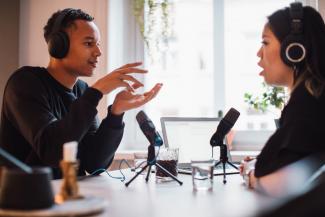
Do the preparation task first. Then listen to the audio and do the exercises.
Preparation
Transcript
Presenter: So, today's expert teacher is Gabriella, a university English teacher from Leeds. Gabriella, hi and thanks for joining us today.
Gabriella: Thanks for having me!
Presenter: So, I have to confess today's topic is something I am really bad at: listening. Most people say speaking is the most stressful part of learning a new language but, for me, with my B1 German, speaking isn't so bad. At least I'm in control of it. But listening … woah … people speak so fast and it's like my brain just shuts down. Am I just really strange and bad at listening? Tell me, honestly, I can take it.
Gabriella: No, you're not strange. In fact, it's really common. You know, in exams most people do pretty well in speaking compared with listening. Of course, exams are a different situation from real life because in an exam you can't ask for something to be repeated or explained. You usually have just one or maybe two opportunities to listen to the dialogue and then it's gone.
Presenter: Right, but in real life I feel stupid always saying, 'Sorry, can you repeat that, please?', especially if I still don't understand even when they repeat it. And people out there listening, I hope you don't do this – quite often the person just repeats what they said equally as fast and I'm still lost!
Gabriella: They do, don't they? In real life, you've got two strategies. One is to pretend to understand and get out of the conversation as fast as you can.
Presenter: Yep, sounds familiar!
Gabriella: But, obviously that's not going to help if it's a conversation with high stakes. It might have important consequences. I mean, if you're just chatting with a stranger at the bus stop, it doesn't matter. But imagine you're at a government office or a bank, trying to find out what paperwork you need to get your ID or open a bank account. What can you do then?
Presenter: I hope you've got the answer, Gabriella, because I'm coming out in a cold sweat just thinking about either of those situations!
Gabriella: The other strategy is to summarise what they said.
Presenter: But how can you do that if you didn't understand what they said?
Gabriella: Ah, well, you only start the summary, so you might say, in German in your case, 'OK, so the first thing I have to do is …?' and make it a question. Or, for example, 'And which office is that again?' Break it down into smaller questions and the other person will naturally start answering them. That way you're controlling the conversation a bit more.
Presenter: I get you ...




In my opinion, we can find a partner who can use English for daily communication, and the partner should be a native speaker.
ı do a lot of things for help listening. If I explain it. Firstly, I trying doing listening practise on this website, and I be exposed to English almost everyday. Because I believe that the more you are exposed to it, you will improve about English.
If someone speaks too fast in a conversation with high stakes, I tell him/her to repeat what he/she said to understand more, but it 's just normal conversation i pretend that i get him/her.
When someone speaks too fast, I usually have two strategies:- I ask him or her to repeat what he or she said or ask him or her to speak slower in order to get what they say, especially if a conversation with high stakes.
I agree with this text, Listening to is one of the most difficult part of learnning a new lenguage, it isn´t imposible, just need pratice like everything.
Listing is the most difficult part for me, I usually try to list natives English speakers, I strive to list once a day native English speakers. However, I am still a bit lost to catch the people and get their ideas.
I listen a lot who speaks English like that this website, YouTube channel, other websites. After I made some practicing, I became understanding than before. To improve fast, I would know that I should practice all four skills, not miss any skill.
I believe that an advantageous way to improve our listening skills is hearing Podcasts and Series with audio in the English original language. As a sample, I have been listening to a Podcast called "Speak English with ESLPod.com" for three months ago, and I have felt a quite enhance in my understanding the English Audio.
I've been listening to British Council audios for 3 months. Every time I listen to the audios, I try to note down new words to use them in my speaking and writing.
some times I don't understand some of the conversions, so I try to listen to audios again.
When I practice listening skills, first, I will try to hear the audio without the transcripts to see how much I understand it. Then I read the transcript carefully to catch its content entirely and listen again to recognise the words/phrases to be missed. I also note the new words and example of each word is the sentence in the transcript. Next, I will try to write what I hear from the audio and check with the transcripts when the audio finishes. I will do this step again until there is no mistake. It costs a lot of time, but I see my improvement in both listening and reading.